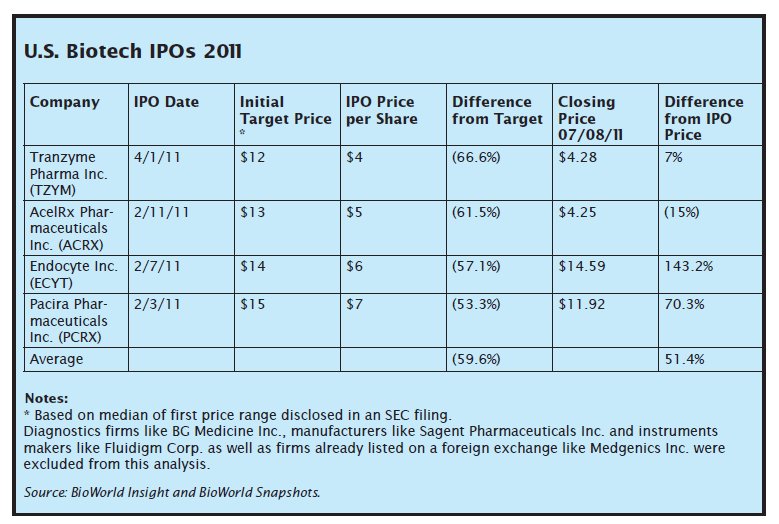Staff Writer
Who's afraid of the big, bad initial public offering (IPO) market? Apparently not cancer firm Merrimack Pharmaceuticals Inc., which filed late Friday to raise up to $172.5 million in an IPO. Apparently not J.P. Morgan, either. The investment bank is listed on Merrimack's book as well as on the book for Clovis Oncology Inc., which last month filed to raise up to $149.5 million in an IPO. (See BioWorld Today, June 24, 2011.)
But most folks on the biotech scene have good reason to be afraid. Only four U.S. biotech IPOs have priced so far this year, and they did so at an average discount of 59.6 percent to their initial target price.
On the bright side, those stocks are now trading up an average of 51.4 percent from their IPO prices. In fact, a recent BioWorld Insight analysis found that the 18 companies comprising the 2009 to 2011 biotech IPO class were trading up 33 percent on average as of May 31. (See BioWorld Insight, June 6, 2011.)
But despite those gains, biotech IPO filing and pricing activity dried up after April of this year, and firms like Clarus Therapeutics Inc. and Ambit Biosciences Inc. fled the IPO queue. It seemed like perhaps the slightly cracked window was about to close . . . until Clovis came along with what looked to be potentially the biggest IPO of the year, aimed at funding clinical trials with three in-licensed cancer drugs: CO-101 , a lipid-conjugated form of gemcitabine in a pivotal trial for pancreatic cancer; CO-338, a PARP inhibitor in Phase I; and CO-1686, a preclinical drug targeting EGFR mutations.
Much like Clovis, Merrimack's lead candidate is a pivotal-stage reformulation of a chemotherapy drug for pancreatic cancer. MM-398 is a stable nanotherapeutic encapsulation of irinotecan, and Merrimack plans to initiate a pivotal Phase III trial by the end of the year in metastatic pancreatic cancer patients who previously failed gemcitabine.
Earlier-stage trials are evaluating MM-398 for other indications like colorectal cancer, lung cancer, gastric cancer and glioma. The drug was developed by Hermes BioScience Inc., which Merrimack acquired in 2009, and Cambridge, Mass.-based Merrimack recently consolidated its interest in the program by acquiring European and Asian rights from Taipei, Taiwan-based PharmaEngine Inc. for $10 million up front, a potential $210 million in milestones and tiered royalties on sales. (See BioWorld Today, May 10, 2011.)
Behind MM-398 Merrimack has MM-121, an ErbB3-targeted monoclonal antibody undergoing a range of early stage trials for various solid tumors. The drug is partnered with Sanofi SA in a deal worth $60 million up front and a potential $470 million in milestones, with Sanofi covering costs. (See BioWorld Today, Oct. 2, 2009.)
In Phase I trials are MM-111, a bispecific antibody targeting HER2 (aka the ErbB2 cell surface receptor) and MM-302, a nanotherapeutic encapsulation of doxorubicin attached to antibodies targeting the ErbB2/HER2 receptor.
MM-151, an oligoclonal therapeutic consisting of three fully human antibodies designed to bind epitopes of EGFR (or ErbB1), is slated for an investigational new drug application filing in the third quarter.
Merrimack is developing companion diagnostics for each of its products. And unlike Clovis, the firm has an internal discovery effort: a platform dubbed "Network Biology" that involves computational models based on quantitative, kinetic, multiplexed biological data and has thus far focused quite a bit of energy on ErbB targeting.
Merrimack raised $77 million in a Series G financing just three months ago, pulling in several crossover investors, many of whom had also invested in the biotech's $60 million Series F round in 2008. (See BioWorld Today, April 18, 2011.)
All told, the biotech had $285.1 million in accumulated deficits as of March 31 and reported net losses between $45 million and $50 million over each of the last three years.
Merrimack is applying to list its stock on the Nasdaq Global Market under the symbol "MACK." Along with J.P. Morgan, its underwriters include BofA Merrill Lynch, Cowen & Co. and Oppenheimer & Co. Specific terms for the IPO have not been set.
In other financing news:
• Anavex Life Sciences Corp., of Hoboken, N.J., raised $1.575 million through the exercise of warrants. Two investors exercised 700,000 warrants for 700,000 shares of common stock at $2.25. Proceeds will be used to continue the Phase I trial of ANAVEX 2-73 for Alzheimer's disease and for general purposes.
• Generex Biotechnology Corp., of Worcester, Mass., entered a securities purchase agreement with certain institutional investors that will raise $2.575 million through the sale of 2,575 units priced at $1,000 apiece and consisting of one share of nonvoting Series A 9 percent convertible preferred stock and one warrant to purchase 100 percent of the shares of the company's common stock issuable upon conversion of such share of convertible preferred stock. Shares of Generex (OTC BB:GNBT) fell 6 cents, or 27.9 percent, Monday to close at 16 cents.

